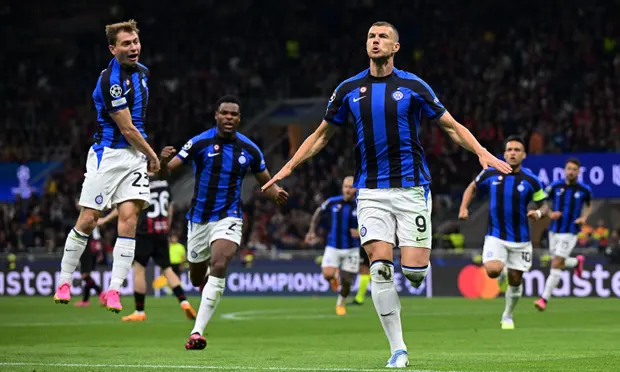After the silence, the explosion. In the hours and the days before this game Milan was an anxious, curiously sullen city: a city on the verge of something, a city waiting for its time. Perhaps on some level Milan has been waiting two decades for a night like this, the game and the occasion that would restore it to the centre of the footballing universe. And as the teams finally emerged for this Champions League semi-final it felt as if all that bottled tension was being released in a single overwhelming moment: an atmosphere that shook that senses, fireworks that rattled the ribs, banners that reached to the sky.
That noise. What must it be like to play football in that kind of noise? With that weight of longing, with all the ghosts of Milans and Inters past, with the awareness that this is your time and it may not come again? San Siro on this crisp Wednesday night was a godly thing: a distinctly Italian song of pure hunger, a screaming and a pleading, the sort of din that forces coaches to talk in sign language. And if there was a certain restraint to the emotions at full time, it was only the knowledge that next week promises more of the same agony.
But after 90 minutes, we have a clear favourite. Simone Inzaghi’s flawed but fearless Internazionale were brilliant here, more experienced and more physical, more disciplined and more focused. They took the early lead with a startling opening burst from Edin Dzeko and Henrikh Mkhitaryan and then held off their bitter rivals through gritted teeth and in the most hostile of environments. Even on their home turf this was an away game, and as fires raged around them they produced a performance to stand alongside any of their great European nights.
They knew that Milan – even without the injured Rafael Leão – could kill them down the flanks. And so their back five put Milan’s wingers in a lethal pincer, squeezing their space, forcing them to play through the centre where they were shorter in numbers and shorter in class. For Milan, Sandro Tonali ran and ran until his studs were blunt, trying to plug the gaps that were opening like quicksand. But Inter were epidemic in that first half-hour – “extraordinary”, as Inzaghi later put it – and could quite easily have finished the tie off there and then.
For Milan, the only small mercy is that there is still a semi-final to salvage. This is a club steeped in the heritage of its seven European Cups, and they will back themselves to upset the odds on Tuesday. But there comes a point when tradition and institutional memory run up against the hard-edged necessities of, you know, being able to clear the ball from your own penalty area. And perhaps Milan were simply disoriented by the size of the occasion, rattled by the noise, blown out of their comfort zone.
They were better in the second half, as Brahim Díaz and Divock Origi finally found some clear air to run into. They might even have nicked a goal. But the pattern of the game was set by its opening, a far more vivid spectacle than any of the pre-match oracles had dared to predict. Dzeko opened the scoring by extending his leg like a periscope to hook Hakan Calhanoglu’s corner into the net. Next Federico Dimarco’s clever cut-back was converted by Mkhitaryan. Inter were rampant. Calhanoglu smashed the post. Lautaro Martínez had a penalty overturned. A flare went off in the Curva Sud, and the delirious Inter fans danced around it like it was the first fire they had ever seen.
Tonali hit the post after the break and for all their vulnerability at the back Milan did manage to create openings. But somehow Inter always had things under control, could always threaten on the break, could always turn to their superior bench as a fallback. Romelu Lukaku, Marcelo Brozovic and Stefan de Vrij came on to lock things down. That depth of experience, that wealth of class is why, for all their missed chances, Inter will be overwhelming favourites to finish the job.
What sort of chance do Milan have? “We have all the abilities we need to turn this situation upside down,” their coach, Stefano Pioli, argued afterwards. “Football teaches us that you can recover. It will not be a stroll in the park. But we need to trust in ourselves.”
They may have Leão back for the second leg, and that at least will be something. But for a club that built its name on the biggest games, the biggest stages and the biggest challenges, there are few bigger challenges than the one that awaits them on Tuesday.


